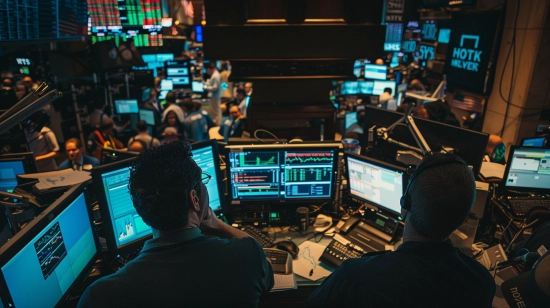| Key Points: – S&P 500 hits an intraday record high driven by strong performance from chip stocks, with Nvidia and Apple leading the charge. – Investors focus on upcoming corporate earnings reports from major companies like Bank of America and Netflix, as well as key economic data. – Boeing and Caterpillar stocks drag on the Dow due to job cuts and rating downgrades, while the broader market shows cautious optimism. |
The S&P 500 and Nasdaq indices reached new highs on Monday, buoyed by a rally in chip stocks and positive market sentiment as investors prepared for a week filled with critical corporate earnings reports and important economic data. The S&P 500 achieved an intraday record high, continuing the momentum it gained from last week’s solid performance. Meanwhile, the Nasdaq also rose as tech stocks, particularly Nvidia and Apple, saw substantial gains.
Nvidia’s stock rose by 2.2%, while Apple gained 1.6%, propelling an index of semiconductor companies to its highest point in over two months. The strength of these companies underscored the resilience of the technology sector, which has continued to lead market gains throughout 2024. With the semiconductor index posting significant growth, the technology sector contributed heavily to the S&P 500’s rise, with five out of eleven sectors inching higher.
Despite the overall strength of the S&P 500 and Nasdaq, the Dow Jones Industrial Average struggled due to underperformance from major industrial stocks. Caterpillar, a bellwether for the industrial sector, fell by 3% after being downgraded by Morgan Stanley from “equal weight” to “underweight.” Boeing also faced challenges, as the company’s stock slipped 2.4% after announcing a larger-than-expected third-quarter loss, job cuts, and a delay in the delivery of its 777X jet.
As corporate earnings season kicks into full gear, investors are eagerly awaiting results from major companies including Bank of America, Citigroup, Johnson & Johnson, and Netflix. Analysts are projecting year-over-year third-quarter earnings growth of 4.9% for the S&P 500. Last week, bank earnings set a positive tone for the earnings season, with JPMorgan delivering strong results that injected optimism into the market.
However, concerns remain regarding high stock valuations. The S&P 500 is trading at nearly 22 times forward earnings, significantly higher than its long-term average of 15.7. As corporate results roll in, companies will need to deliver strong numbers to justify the elevated stock prices, making this earnings season a pivotal moment for the market.
In addition to earnings reports, investors are keenly watching for crucial economic data, particularly the September retail sales figures due to be released on Thursday. These figures are expected to provide insight into the financial health of U.S. consumers, a key factor influencing market sentiment.
On the monetary policy front, Minneapolis Fed President Neel Kashkari made headlines by suggesting that modest interest-rate cuts could be on the horizon as inflation nears the Federal Reserve’s 2% target. Similarly, Fed Governor Christopher Waller is set to provide further insights into the Fed’s stance on interest rates. While investors have scaled back expectations for a large interest-rate cut, the CME Group’s FedWatch tool shows an 84.2% probability of a 25-basis-point reduction at the Fed’s November meeting.
While tech stocks soared, other sectors showed more caution. Boeing’s job cuts and delivery delays, alongside Caterpillar’s rating downgrade, weighed on the Dow, dragging the index down by 0.10%. Meanwhile, energy stocks took a hit as oil prices declined, with the energy sector slipping 0.4%. On the other hand, defense stocks such as Northrop Grumman and Lockheed Martin saw gains amid rising geopolitical tensions, including Iran’s missile launch against Israel.
In contrast, B. Riley Financial experienced a significant 20% jump after announcing a deal to sell its Great American Group unit to Oaktree Capital for $386 million, reflecting optimism in the financial sector.
Despite these mixed performances, the overall market remains cautiously optimistic as traders brace for a critical week that will provide further clues about the strength of corporate America and the broader U.S. economy.
